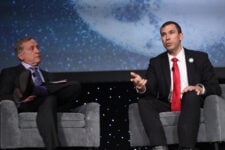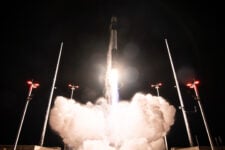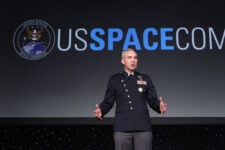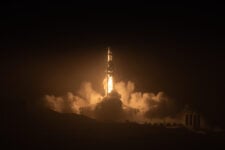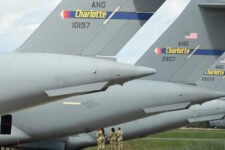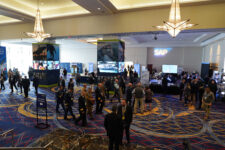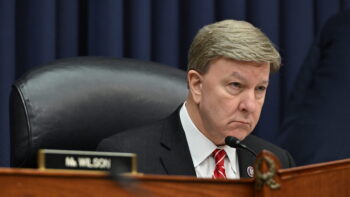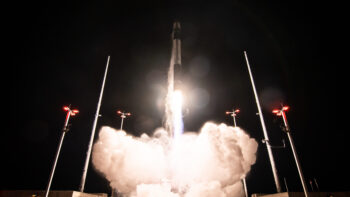
Space junk is an increasingly dire problem. (NASA illustration)
WASHINGTON: John Plumb, White House nominee to be the first-ever assistant secretary for Pentagon space policy, today signaled support for a ban on destructive anti-satellite (ASAT) weapons tests.
Such a ban, he told lawmakers, “would certainly help” the Defense Department protect its space assets, citing the call by Deputy Defense Secretary Kathleen Hicks at the first Biden administration meeting of the National Space Council on Dec. 1 for nations to refrain from debris-creating ASAT tests.
“Kinetic destructive tests pose a long-term, enduring problem to all spacefaring nations, including astronauts,” Plumb said during his confirmation hearing before the Senate Armed Services Committee.
His remarks are yet another indication that the administration is leaning toward moving forward with a unilateral moratorium on debris-creating ASAT testing, and calling on other nations to follow suit.
The question of ASAT weapons was very much on senators’ minds in questioning Plumb in the wake of Russia’s test in November that forced the crew (including Russian cosmonauts) of the International Space Station to take measures to protect themselves and the station from the resulting debris.
The case for a unilateral US moratorium was most recently laid out in an article, “The ASAT Prisoner’s Dilemma: Making the Case for U.S. Leadership and a Unilateral Moratorium on Kinetic-Energy Anti-Satellite Testing,” published Wednesday by the Center for Strategic and International Studies’ Aerospace Project, with authors including Doug Loverro, head of DoD space policy under President Barack Obama, and Robert Cardillo, former director of the National Geospatial-Intelligence Agency.
The authors — who also included Secure World Foundations’s Brian Weeden, physicist Brian Chow, and Georgetown University graduate student Brandon Kelley — argued that such a ban “may be better understood as an environment sustainability measure than as an ‘arms control’ measure per se — but, for exactly that reason, is in the clear self-interest of all parties.”
They further noted that there is precedent for such unilateral moratoria to lead to international accords that have reduced strategic risks. For example, the paper explains, the 1991 unilateral nuclear test moratorium declared by Soviet leader Mikhail Gorbachev was followed a year later by the United States and led to UN agreement in 1996 on the Comprehensive Test Ban Treaty.
Plumb, most recently government relations head at the Aerospace Corporation, would be the first person to hold the position of assistant secretary of defense for space policy, a slot created by Congress in the 2020 National Defense Authorization Act.
During the hearing, he repeatedly stressed his support for the development of “norms and rules of behavior” in space in response to questions from a number of senators. He pledged that if confirmed, he would work closely with the State Department on US efforts to craft proposals for international norms.
The UN General Assembly on Christmas Eve passed a UK-sponsored resolution, A/RES/76/231, that creates a special working group to hash out recommendations for “Reducing space threats through norms, rules and principles of responsible behaviours.” The group will meet in four sessions over the next two years, starting next month. A number of countries, including Canada, have expressed support for including a destructive ASAT ban among the working group’s recommendations.
The Biden administration has supported the UK in its drive to get serious discussions on constraining destabilizing military activity in space on the table at the United Nations. The President’s Interim National Security Strategic Guidance [PDF] pledged the US to lead development of international norms. And Jake Sullivan, Biden’s national security advisor, told the National Space Council meeting that the National Security Council would be working closely with the other members of the council to propose new global norms for military activities.
While China and Russia voted “no” on the creation of the so-called Open-Ended Working Group, Plumb said held out some vague hope that Beijing and Moscow would be willing to work constructively on norm setting. At the same time, he stressed that “nothing prevents” the US from developing both offensive and defensive weapons to counter Chinese and Russian threats to American space assets.
Plumb faced little hard questioning during the SASC hearing and is expected to be confirmed.
HASC chair backs Air Force plan on space Guard units (Exclusive)
House Armed Services Chairman Mike Rogers tells Breaking Defense that Guard advocates should not “waste their time” lobbying against the move.



